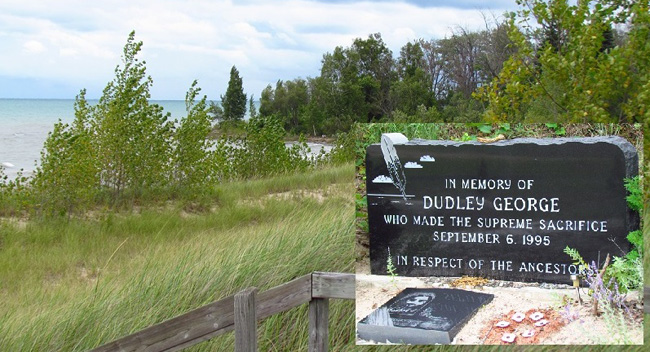Remembering Dudley George and the return of Ipperwash Park

By Greg Plain
First Nations people across Turtle Island will remember that fateful day on September 6, 1995, when an unarmed Native Rights activist was protecting lands that are rightfully First Nation owned, and ensured those lands were returned by the Canadian Government.
In March 1993, members of the Chippewas of Kettle & Stony Point First Nation went into the Camp Ipperwash army training facility, once the property of the First Nation, and took the lands back for the Nation. The agreement that the Government put forward in 1942 was that once the lands were no longer being utilized as a training camp they would be returned in full to the Nation. The members waited a long time for this to happen and were tired of waiting.
So Nation members and descendants of the original inhabitants moved in and took the Camp back themselves. While it was a very touchy subject with the occupiers (Government), the members took up residence. Once the Camp was occupied, in 1995 they then went after Ipperwash Provincial Park, as this was originally part of the Nation as well. The lands were utilized in history as a Burial Ground for the Nation members, close to the waters of Lake Huron.
Once this action was taken the OPP were brought in and tensions were very high. There were many Nation members from across the area that came to support the occupation of Ipperwash Provincial Park and Camp Ipperwash.
On the night of September 6, 1995, Dudley George was gunned down and subsequently died due to the gun shots from the OPP that night.
Today is the 20 year anniversary of the shooting at Ipperwash and it will be remembered as a very dark time in Anishinabe History.
The former Camp Ipperwash today is still occupied by approximately 50 Kettle & Stony Point members who have lived on the land and occupied the buildings. Mike Cloud is the Security and Maintenance Co-ordinator for the Camp. Mike says, “We employ eight full time members to assist in the security of the Camp and maintenance of the lands, including buildings, and keeping the grass cut.”
In 1995 there were approximately 70 living members that resided at Stoney Point Reserve who were moved over to Kettle Point, a 15-minute drive up the road. Now there are about seven members left alive that actually lived at Stoney Point prior to the Camp lands being taken.
While the last 20 years have been hard for all involved, there has been a lot of movement in the repossession of the lands. Sam George fought every day after his Brother was killed, ensuring that his life was not taken in vain. Sam fought to ensure that there was in Inquiry into the death of his brother, and this was finally put forward years later and completed by Commissioner Sidney B. Linden.
On May 31, 2007, the Ipperwash Inquiry was complete. Its mandate was to inquire and report on events surrounding the death of Dudley George. The Inquiry was also mandated to make recommendations to avoid violence in similar circumstances in the future.
http://www.attorneygeneral.jus.gov.on.ca/inquiries/ipperwash/index.html
The community continued to move forward in negotiations to get its lands back at Stoney Point and are now moving forward with a vote on the Final Settlement Agreement. Suzanne Bressette is the Communications Officer for the Chippewas of Kettle & Stony Point First Nation and said, “We just completed the advanced poll for the negotiated Final Settlement Agreement on August 18, 2015 and the ratification vote will be held at the Hillside Gymnasium on Kettle & Stony Point First Nation on September 18, 2015. Members must bring their status card to be eligible to vote.”
This agreement will not heal all from 20 years back, or even longer from when the lands were taken by the Department of National Defense (2,240-acre Stony Point Reserve) under the authority of the War Measures Act on April 14, 1942. But for some, it will bring closure and the return of lands back to the Nation.

